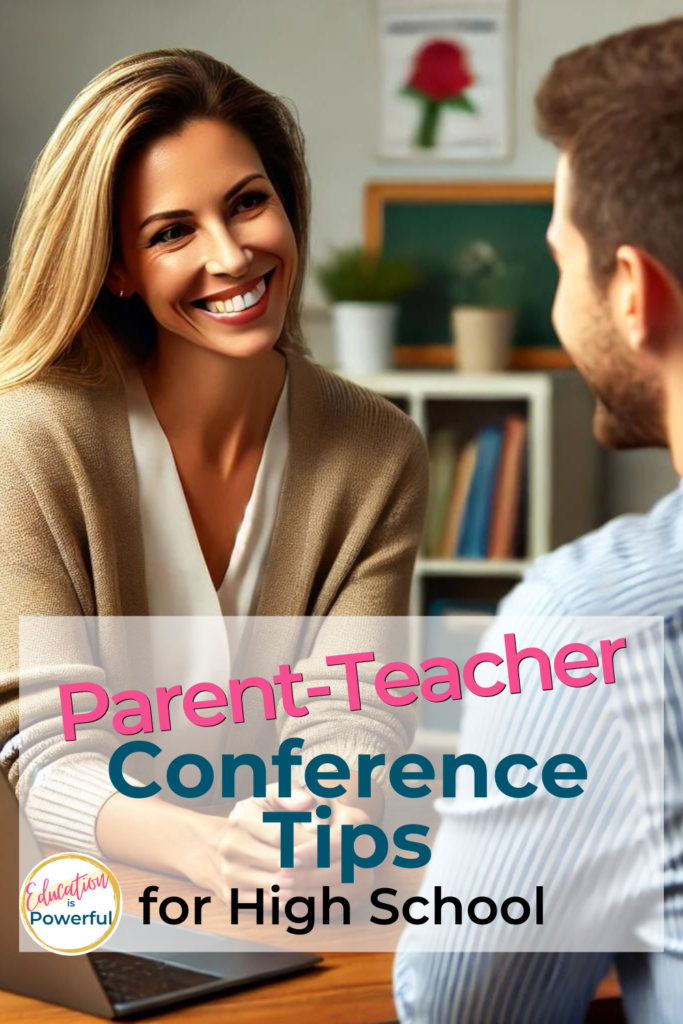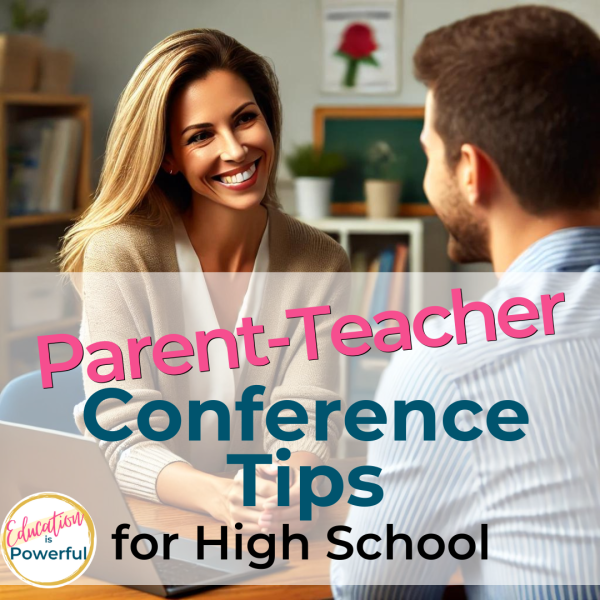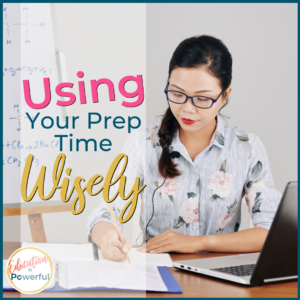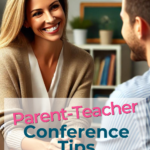As a high school English teacher, whenever parent-teacher conferences come around, I’m lucky if I get 15 to 20 parents. I know that sounds really nice. But sitting in my room for eight hours waiting for parents to come in is not that fun.
I know some teachers who love it because they get a lot of grading done, but I have a hard time focusing on grading when someone might be walking into my room at any moment. I hate being caught off guard that way. So, to keep myself entertained, every year I create a parent-teacher conference bingo card and send it out to the faculty.
And every year through instant messages, we keep each other updated on where we are on the bingo card and I award prizes. Now, not every teacher finds this appropriate, but for those of us who enjoy it, it’s a fun way to pass the time. So you can check that out here and get it for free. And maybe you’ll want to play with your faculty for your next parent-teacher conference.
But in all seriousness, I remember my first year of teaching and how nervous I was every single time parent-teacher conferences would come around. So, today I want to speak to all of our new teachers out there about parent-teacher conferences and how to make them as successful and positive as you can.
What is the purpose of Parent-Teacher Conferences?

1. Build connections between families and teachers
The first thing we really should discuss is the purpose of parent-teacher conferences. And the number one purpose is to build connections between families and teachers. I know that especially for secondary teachers, our parents may not know all of their children’s teachers.
I’ll never forget one time I had a parent come in and they showed me a picture of their child and said, “This is Elizabeth. I am Elizabeth’s mother.” The parent felt like her teachers never knew who her daughter was. And I responded, “Oh, Elizabeth. I know Elizabeth. She’s super quiet.” We had a good talk and the mother told me that I was the only person who knew who her daughter was. I thought that was really sad.
So, remember this is a chance for you to build relationships and communication with parents in a way that is way more personable than trying to do it over email or a phone call. This first positive interaction can help you later on when you might need to reach out to a parent with a concern.
2. Get to know some of your students’ struggles
I think the second purpose of parent-teacher conferences is to really get to know some of your students’ struggles. When they come into our rooms, we don’t know what they’ve left at home. And I’ve decided that teenagers are the best actors in the world because I will often be very surprised at parent-teacher conferences. When I see the parents and the family, I often learn more about the family dynamics and environments they live in.
Twice in my career I have had to ask a parent to not hit their child in front of me. It was one of those moments that I walked out of my room after the parent-teacher conference, went down to the administrator offices, and asked if I needed a file a complaint with family services. Let me tell you my relationship with both of those students changed. I tried to be so positive with that student and I never called home again. If that student and I had an issue in class, whether it was a behavior issue or about grades, I did not want to call home. I did not want to give that parent any reason to physically abuse that student.
But I think you also get to hear from parents about where their children may struggle. Teenagers will often not do this in front of their peers. They don’t want to come up to you after class or in the middle of class or raise their hand and say, “I need help.” No matter how safe of a classroom you have.
3. Problem-solve With Parents
Lastly a parent-teacher conference is really an opportunity for you to problem-solve with parents. This is where you can express your concerns. The parent can tell you what’s happening, help you see another perspective, and then together you can make a plan.
I love it when parents bring their students to parent teacher conferences, because then I will actually talk to the student and work with the student, with the parent there and say, “Does this work for everyone? Is this something we think we can do.” I find this approach respectful to the student and gives them a voice in their education.

What isn’t the purpose for Parent-Teacher Conferences?
Did you notice what wasn’t on this list?
1. To get kids in trouble. It’s not on the list. 2. Have a chance to tell a parent all the things that their kid does wrong. 3. A place where you get to prove yourself right.
That’s not what this is about. If you use your parent-teacher conferences to accomplish those things, you are setting yourself up for a negative relationships with parents. Which will lead to negative relationships with your students. Relationships of mistrust and they can very quickly turn on you. Don’t do it.
Use your parent-teacher conferences as a way to build relationships with families and students and build positivity into your classroom.
How do I start my Parent-Teacher Conferences?
So let’s start about how you actually start a parent-teacher conference. Now if your district is like mine. They don’t sign up. Many just show up. So. A parent will walk into my room and I need to be on, I need to be positive and smiling. If a student walks in with them. Great. Hopefully I can place the student in my classes.
But I’ll be honest, first semester it is hard. I have close to, or over 40 students in every single class. So I have around 220 – 250 students every single semester. And because my mythology classes are semester classes I get new students each semester. So by the end of the year, I will have over 350 to 400 students.
That’s a whole heck of a lot of names to remember. So, here are some tricks. For how I start my parent teacher conference.
1. How do I remember all my students’ names and what class they are in?
I always have a sign in sheet and as parents come in I will greet them and pretend I am pulling up the students grade, but what I’m actually doing in slyly watching the parent fill out the sign in sheet with their student’s name.
Because that’s what I need. I don’t need the parent name. Not yet. I need that student name.
So they start writing their student’s name. And I start identifying what period their student is in. It might go something like this:
- Teacher: Erin’s in second period. Right?
- Parent: oh, no, fifth.
- Teacher: oh my gosh, I’m so sorry. I mean, they’re both in the morning.
But now I know what period and the student’s first name and their period. I can pull up the student’s information and the parent feels like I know their student – even if it has only been a few weeks since school started.
2. How to immediately show parents and students that you care about them
My second tip is use a seating chart. If you’ve read my blog post about building positive relationships with students, then you know, that I use my seating chart to take notes on my students. The weeks leading up to parent-teacher conferences, I make sure that I’m writing down as much as I can about students. It means a lot to parents and students when I can talk to them about something they are interested in.
For example, Andrew comes in with his parents. As I’m pulling up his class and flipping through my papers, I look at my seating chart and it says “Football” next to his picture. So, now I can say, “Hey, are you going to get to start at the football game this weekend? For the sophomore team. Oh, my gosh, you’re starting for the JV team. That’s amazing!” That immediately tells the student and the parent that you care about them and you know, something about them.
And it goes a long way. So use that sign in sheet. Use your seating chart.
And get started.
3. Start with Feedback – feedback to the teacher
The second way to start a parent teacher conference. Once, you know, their name, is to ask the student (if the student’s there), “What’s your favorite thing we’ve done so far in class?” This starts the parent-teacher conference out on a positive light.
It also forces the student to think about something that we’ve done, that he/she liked. And it helps the parent to see that their child likes my class. Now, in my 18 years of teaching, have I had a student say nothing? or “I hate English.”
Yes.
Yes, I have.
And teenagers are honest and wonderful that way. And you know what? That’s okay. I respond by saying, “Oh my gosh. I’m so sorry. What would you like? What would make it better?” Because I’m showing that I care about what they think.
It may be difficult for you to hear negative feedback from students, but it is a great opportunity for you to show some empathy and get to the root of the problem.

4. Update parents on what you are doing in class currently and coming up
Then usually I’ll give the parents a little summary of what’s happening in the class and our upcoming projects or larger assignments. I will give them the latest copy of their grade and assignment sheet. I’ll highlight their missing work, review retakes or revision opportunities, and highlight what students are succeeding at.
I also prepare a half sheet of paper with upcoming projects, links to our class pages, reminders, and any other important information I want to make sure all parents have. And for the parents who don’t come to parent teacher conferences, I will mail this home with the most current grade and assignment report.
I try to keep this to a short 1-2 minutes. It isn’t the bulk of my conference time. I spend most of that time asking parents about their concerns.
5. Ask parents what their concerns are
The next thing I do is to ask parents what their concerns are. It allows them to open up the conversation. You would be surprised at how many parent don’t care, what grades their kids get. They don’t care about their assignment. But they might be concerned that their student is struggling with the writing. Or struggling with working in groups. Or that their grandfather just died and they are having a hard time concentrating in class.
Parents may not have specific concerns until after I review their student’s grades and upcoming projects. They usually just didn’t know what is going on in our classes. By not being afraid to ask parents for their thoughts, I can immediately address and answer their concerns.
Nine times out of 10, if a parent or a student expresses their concerns, it’s also on my concern list. But instead of me bringing it up, they’re the ones who are bringing it up. It changes the conversation from “Your students is ____” to “I’m concerned about ____ as well. Thank you for bringing that up.”
And we’re immediately, problem-solving a concern that this student or this parent has.
End on the positive
Parents need a little positivity too. Compliment the student on who they are as a person. Are they kind, thoughtful, funny, friendly, supporting, good partners or group members?
Raising children is a tough job and parents also feel the praise and positivity when we praise their students. My own mother once told me that she never missed a parent-teacher conference because she loved hearing all the compliment about me – it made her feel like she was a good mom.
Big Concern? Meet before Parent-Teacher Conferences
I really am going to caution you that if you have a huge concern about a student, don’t wait for parent-teacher conferences to have those conversation. Those conversations often will last quite a bit longer than you will have time for.
The last thing you want is to have a line of parents waiting to speak to you while you are trying to have serious conversations when there are people listening. It is embarrassing for you, for the parents, and for the student.
Also you really can’t solve anything in five minutes. So. If you’re concerned do it before parent teacher conferences don’t wait.
Partnering with Parents
And in conclusion, remember. We’re partners with parents. We’re all on the same team. We all want our students to succeed. I have not met a single parent who wants their children to fail.
Even parents who are really struggling want their kids to be as successful as they can be. This is your chance to really build relationships. And have a little fun. So don’t forget to download this parent teacher conference bingo card and have little fun too.




